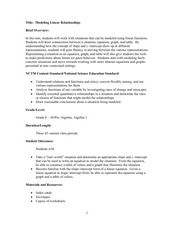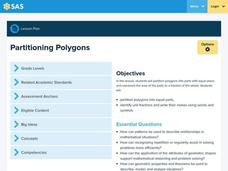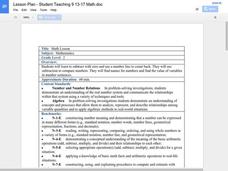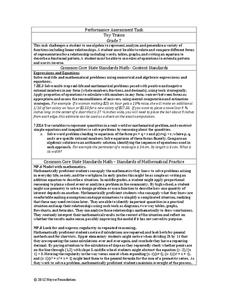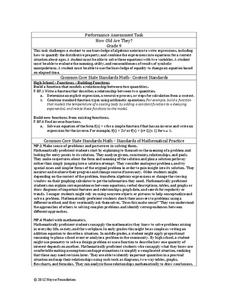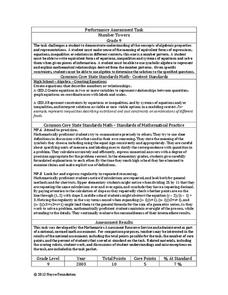Curated OER
Scientific Notation
In this Algebra I/Geometry/Algebra II activity, students convert numbers form standard notation into scientific notation and vice versa. The one page activity contains fifteen problems. Answers are provided.
Curated OER
Quick Quiz- Decimal Place Values
In this decimal place value worksheet, students complete a ten question multiple choice and short answer quiz about decimals. Students identify the digit in different places and translate numbers into word form.
Curated OER
Place value concepts
Third graders participate in classroom game to practice place value skills. For this place value lesson, 3rd graders recognize matching digits of the same value. Students record their numerals and their value by writing in standard...
Buffalo State
Adding and Subtracting Integers Unit
Just because one integer is larger than another doesn't mean it will make sense right away. Go beyond note taking and show learners, through the use of algebra tiles and a Four-Pan Algebra Balance, how the numbers relate to one...
Visa
Financial Forces: Understanding Taxes and Inflation
Take the opportunity to offer your young adults some important financial wisdom on the way taxes and inflation will affect their lives in the future. Through discussion and review of different real-world scenarios provided...
Curated OER
Modeling Linear Relationships
Students graph lines using the slope and y-intercept. In this algebra lesson, students create data using tables and equations. They use their data to make predictions and draw conclusion.
Curated OER
Fraction Strips
Get a handle on equivalent fractions through the use of manipulatives. Using area models, sets, and length manipulatives like fraction strips and Cuisenaire rods, the class will gain a deeper understanding of equivalent fractions....
Pennsylvania Department of Education
Problem Solving with Fractions
Solve story problems using fractions or decimals. Then, determine the reasonableness of answers using estimation.The detailed instructional activity includes essential questions, vocabulary, a materials list, and links to related units.
Curated OER
Discovering Math: Concepts in Algebra
Students learn that speed is a function of time and distance, a quadratic equation can be used to figure out the path of fireworks, a photographer can use Algebra to figure out how many rolls he can afford if he needs twice as much of...
Curated OER
Number Line Math
Second graders use a number line to practice subtraction. In this subtraction activity, 2nd graders use a number line to count backwards. Students participate in mad math activities and solve problems.
Curated OER
Exploring Geometric Constructions of Parabolas
Young scholars are introduced to the construction geometrically of parabolas. Using a software program, they identify lines, segments and midpoints. They label the parabolas properties and characteristics and use a formula to determine...
Curated OER
Math: a World of Symmetry
Students expand their knowledge of quadrilaterals and identify basic symmetrical forms. Over three weeks, they explore the math, application, and discussion of symmetry. After conducting Internet research, students create symmetrical...
Noyce Foundation
Toy Trains
Scholars identify and continue the numerical pattern for the number of wheels on a train. Using the established pattern and its inverse, they determine whether a number of wheels is possible. Pupils finish...
Inside Mathematics
How Old Are They?
Here is a (great) lesson on using parentheses! The task requires the expression of ages using algebraic expressions, including the distributive property. Pupils use their expressions to determine the individual ages.
Inside Mathematics
Magic Squares
Prompt scholars to complete a magic square using only variables. Then they can attempt to solve a numerical magic square using algebra.
Inside Mathematics
Two Solutions
Many problems in life have more than one possible solution, and the same is true for advanced mathematics. Scholars solve seven problems that all have at least two solutions. Then three higher-level thinking questions challenge them to...
Inside Mathematics
Conference Tables
Pupils analyze a pattern of conference tables to determine the number of tables needed and the number of people that can be seated for a given size. Individuals develop general formulas for the two growing number patterns and...
Charleston School District
Solving Systems by Inspection
Can you solve a system by just looking at it? The previous lessons in the series taught three methods of solving systems of equations. Now learners discover they can determine the number of solutions of a system just by looking at it....
Noyce Foundation
Time to Get Clean
It's assessment time! Determine your young mathematicians' understanding of elapsed time with this brief, five-question quiz.
Inside Mathematics
Snakes
Get a line on the snakes. The assessment task requires the class to determine the species of unknown snakes based upon collected data. Individuals analyze two scatter plots and determine the most likely species for five...
Inside Mathematics
Number Towers
Number towers use addition or multiplication to ensure each level is equal. While this is common in factoring, it is often not used with algebraic equations. Solving these six questions relies on problem solving skills and being able to...
Inside Mathematics
Quadratic (2006)
Most problems can be solved using more than one method. A worksheet includes just nine questions but many more ways to solve each. Scholars must graph, solve, and justify quadratic problems.
Inside Mathematics
Graphs (2006)
When told to describe a line, do your pupils list its color, length, and which side is high or low? Use a learning exercise that engages scholars to properly label line graphs. It then requests two applied reasoning answers.
Inside Mathematics
Hexagons
Scholars find a pattern from a geometric sequence and write the formula for extending it. The worksheet includes a table to complete plus four analysis questions. It concludes with instructional implications for the teacher.







